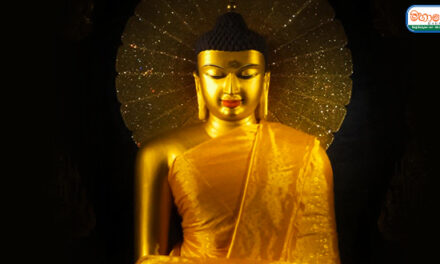In this life, rarely can we succeed in our endeavors without skill and effort. Without skill, i.e. an ability to perform a task well, our effort won’t be of much use. And without effort, even if we possess the skill, we waste our potential and yield to complacency and laziness; we fail to develop our skills further or reap the most benefit from them.
When we set goals for ourselves in life, we often envision a path of progress toward achieving those goals. The loftier the goal, the steeper and longer the path of progress, yet greater is the reward. No matter what our worldly goals in life may be—education, social status, wealth, family, career, etc.—as disciples of the Buddha we should not forget our goals in practicing the Dhamma, and the looming danger that death and rebirth entail if we fail in our endeavors. Having gained the most opportune moment, that is birth as a human possessing the faculty of wisdom together with the rare chance to hear the Dhamma proclaimed by a Buddha, we must be heedful in making a concerted effort toward achieving our goals in this Gautama Buddha’s Dispensation.
Just what should our goals be in the Dispensation? How should we set them? The Buddha’s Teachings can be understood as leading to three types of benefit, in order of increasing happiness: practicing the Dhamma leads to (1) happiness in this life, (2) a fortunate rebirth in heavenly realms of greater happiness, pleasure, and glory than the human world, and (3) the supreme bliss of Nibbāna, the summum bonum of the Dhamma, the end of suffering. In order to develop toward these goals, we should cultivate both our skill in practicing the Dhamma and our effort in doing so. Remember, effort in practicing the Dhamma is the constant effort we put in to abandoning the unwholesome and developing the wholesome.
One way by which the Buddha describes how a noble disciple develops in the Dispensation is the Five Powers of a Trainee (sekha bala). A trainee is a practitioner who follows the Noble Eightfold Path but has not yet become an Arahant. Arahants are known as “Asekha” meaning, ones who have completed the training. The Buddha explains the Five Powers of a Trainee thus:
“Monks, there are these five powers of a trainee. What five? The power of confidence (saddhā), the power of moral shame (hiri), the power of moral dread (ottappa), the power of energy (viriya), and the power of wisdom (paññā).” (AN 5.1 – Sekhabala Saṃkhitta Sutta)
These five powers of a trainee aid in the gradual development of the path; they assist a noble disciple in training in the path toward Nibbāna. The power of confidence is to have confidence in the Enlightenment of the Buddha and his nine incomparable, world-transcending qualities: “The Blessed One is an Arahant, perfectly self-enlightened, accomplished in true knowledge and conduct, traveler of the Noble Eightfold Path, knower of the world, unsurpassed trainer of persons to be tamed, teacher of devas and humans, the Enlightened One, the Blessed One.” The power of moral shame is to be ashamed of misconduct by body, speech, and mind and of acquiring unwholesome qualities. The power of moral dread is similar, that is, to dread misconduct by body, speech, and mind, and to dread acquiring unwholesome qualities. Further, the power of energy is the effort to abandon the unwholesome and develop the wholesome. The crown jewel of the five powers of a trainee is wisdom, which the Buddha describes as the “wisdom that discerns arising and passing away, which is noble and penetrative and leads to the complete destruction of suffering.” This refers to a deep insight into the principle of cause and effect, e.g. the insight into the impermanence of the five aggregates of clinging, the impermanence of the six sense bases, Dependent Origination, etc. It is this insight that leads to the eradication of ignorance (avijjā) and irreversible destruction of defilements.
With a bit of reflection, we can understand these five powers of a trainee in practice. Even if we haven’t yet attained any fruits of the path, we can still base ourselves in these five powers. If we have confidence in the Buddha, naturally we would want to develop the wholesome and abandon the unwholesome, with the understanding that the former leads to our long-term happiness while the latter begets suffering in the grand scheme of things. Out of confidence in the Buddha we begin to gradually understand the biggest and the most dangerous problem in our lives—that we are trapped in a potentially endless cycle of birth and death, victims of suffering and our own kamma. To gain such a perspective, and to understand deeply the ramifications of unwholesome actions by body, speech, and mind, we no longer act for our own detriment—we have developed the qualities of moral shame (hiri) and moral dread (ottappa).
Moral shame and moral dread thus support virtue, since they protect us from entering upon the unwholesome. The Buddha explains that actually all five of the powers of a trainee function in this way as barriers against the unwholesome:
“Monks, there is no entering upon the unwholesome so long as confidence, moral shame, moral dread, energy, and wisdom are securely settled in cultivating wholesome qualities. But when confidence, moral shame, moral dread, energy, and wisdom have disappeared and lack of confidence, moral shame, moral dread, energy, and wisdom obsesses one, then there is the entering upon the unwholesome.” (AN 5.6 (condensed) – Akusala Samāpatti Sutta)
As we discussed earlier, a concerted effort is necessary in practicing the Dhamma. Why? Because it is no easy matter to develop wholesome qualities. For a long time in saṃsāra we have cultivated the unwholesome and thus are our minds habituated. To develop the wholesome is to go “against the stream” (paṭisotaṃ)—against the stream of the materialism and antinomianism of modern, globalized society, against the stream of our desires and defilements of mind.
Gradually, with the support of these five powers of a trainee, the Dhamma practitioner develops the Noble Eightfold Path within themselves, progressing successively to higher stages of realization. We are not necessarily out for quick progress, rather, with much patience, if we can develop gradually by practicing the right path over a long period—that is valuable. However fast we might travel down the wrong path, we will never succeed in reaching our destination. Traversing the right path, however slowly, always means progress: step-by-step one day we will reach our goal.
By a Venerable Thero of Mahamevnawa Buddhist Monastery














Recent Comments